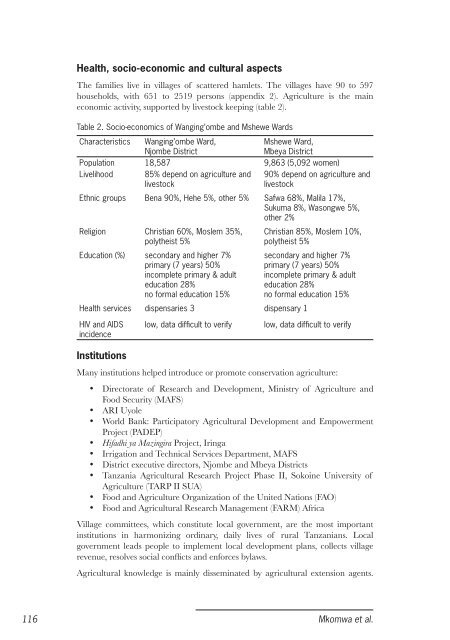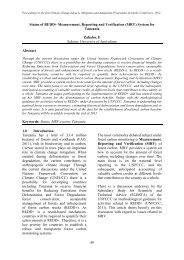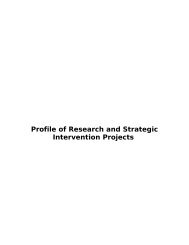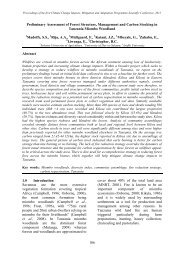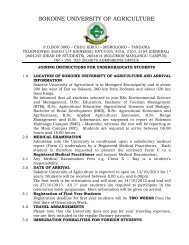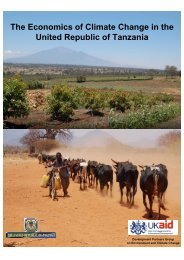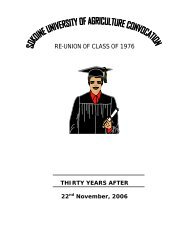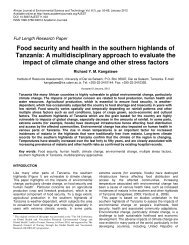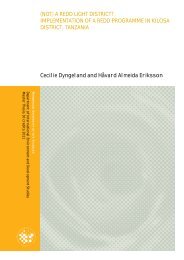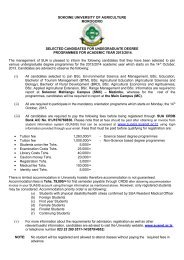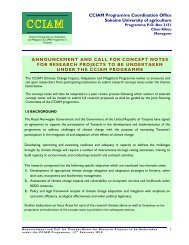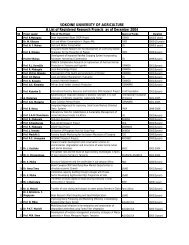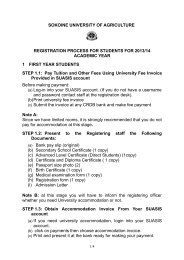Health, socio-economic and cultural aspectsThe families live in villages of scattered hamlets. The villages have 90 to 597households, with 651 to 2519 persons (appendix 2). Agriculture is the maineconomic activity, supported by livestock keeping (table 2).Table 2. Socio-economics of Wanging’ombe and Mshewe WardsCharacteristicsWanging’ombe Ward,Njombe DistrictMshewe Ward,Mbeya DistrictPopulation 18,587 9,863 (5,092 women)Livelihood 85% depend on <strong>agriculture</strong> andlivestock90% depend on <strong>agriculture</strong> andlivestockEthnic groups Bena 90%, Hehe 5%, other 5% Safwa 68%, Malila 17%,Sukuma 8%, Wasongwe 5%,other 2%Religion Christian 60%, Moslem 35%,polytheist 5%Education (%) secondary and higher 7%primary (7 years) 50%incomplete primary & adulteducation 28%no formal education 15%Christian 85%, Moslem 10%,polytheist 5%secondary and higher 7%primary (7 years) 50%incomplete primary & adulteducation 28%no formal education 15%Health services dispensaries 3 dispensary 1HIV and AIDSincidencelow, data diffi cult to verifylow, data diffi cult to verifyInstitutionsMany institutions helped introduce or promote conservation <strong>agriculture</strong>:• Directorate of Research and Development, Ministry of Agriculture andFood Security (MAFS)• ARI Uyole• World Bank: Participatory Agricultural Development and EmpowermentProject (PADEP)• Hifadhi ya Mazingira Project, Iringa• Irrigation and Technical Services Department, MAFS• District executive directors, Njombe and Mbeya Districts• <strong>Tanzania</strong> Agricultural Research Project Phase II, <strong>Sokoine</strong> University ofAgriculture (TARP II SUA)• Food and Agriculture Organization of the United Nations (FAO)• Food and Agricultural Research Management (FARM) AfricaVillage committees, which constitute local government, are the most importantinstitutions in harmonizing ordinary, daily lives of rural <strong>Tanzania</strong>ns. Localgovernment leads people to implement local development plans, collects villagerevenue, resolves social conflicts and enforces bylaws.Agricultural knowledge is mainly disseminated by agricultural extension agents.116 Mkomwa et al.
Three agricultural officers serve the 4595 households in the 12 villages ofWanging’ombe Ward, all based at the Wangin’gombe field centre. Mshewe Ward,with 2127 households in 8 villages, is served by four extension officers; three basedin specific villages and one in Mbalizi town. The extension officers respond to theofficial district directives in addition to addressing individual farmer requests andworking with external project interventions. They supervise farm conservation<strong>agriculture</strong> trials and link farmers with researchers and suppliers.Each village in Wanging’ombe Ward has a primary school. Two secondary schoolsin Ilembula and Wanging’ombe (within 8 km) are important in providing highereducation. Schools are sometimes used as trial sites for new technology.Wanging’ombe Village also has a dispensary, primary court and monthly livestockmarket, all important to the ward. The main shopping centre for Wanging’ombeDivision is Makambako town, 25 km to the east.All the Wanging’ombe Ward villages are connected by all-weather roads, which areless than 15 km away from the <strong>Tanzania</strong> Zambia (TANZAM) highway, connectingDar es Salaam with Lusaka. The railway (Utiga Station) also serves the ward. Allvillages enjoy mobile telephone connections and piped water within 400 m from eachhousehold. The electricity network is connected to Wanging’ombe village only.Mshewe Ward has a primary school for each village but no secondary school. Thenearest is in Mbalizi town, about 35 km away on a permanent gravel road. Majormarkets for the crop and livestock products are outside the village, so farmers haveto use these roads. Mbalizi town is also the most important centre for the ward; it isthe main shopping centre. It has a health centre and several private pharmacies andhas the main market for crops and livestock. A monthly livestock market at Mjele,20 km north of Mshewe, attracts many businesses from outside the district andcaters for many needs, including animal-drawn implements and hand tools. TheTANZAM highway and a railway station of the <strong>Tanzania</strong> Zambia railway servesMbalizi town. Electricity and telephone services are also available.5 Agricultural enterprisesThe livelihood of the people in Wanging’ombe and Mshewe Wards dependsalmost entirely on crop and livestock production. Over 95% of the labour forceis self-employed in <strong>agriculture</strong>. These farmers eke out a living by using their land,knowledge in selecting crops and livestock, and innovative coping strategies. Theaffordability of a newly introduced technology or its profitable use depends onthese assets.CropsThe major crops grown in Wanging’ombe Ward are maize, sunflower, cowpea,beans, groundnut, bambara nut, cassava, finger millet, sweetpotato, popcorn andvegetables. All crops are grown for food and cash, except sunflower and popcorn,which are solely for cash.Mbeya District 117
- Page 6:
ContentsPreface ...................
- Page 10:
Full conservation agriculture, howe
- Page 13 and 14:
February 2005, which made possible
- Page 16 and 17:
Table B. Key characteristics of cas
- Page 18:
Overemphasis on field-scale, techni
- Page 26 and 27:
Arumeru DistrictCatherine W. Maguzu
- Page 28 and 29:
8 Gaps and challenges .............
- Page 30 and 31:
Executive summaryA case study of co
- Page 32 and 33:
It has shown increase in yields, re
- Page 34 and 35:
The case study teamThe local team w
- Page 36 and 37:
NgorongoroKageraMaraMonduliArumeruM
- Page 38 and 39:
MarketsThe urban centres are Kikati
- Page 40 and 41:
middle-aged, who migrate to towns t
- Page 42 and 43:
4 Conservation agriculture historyI
- Page 44 and 45:
maize, pigeon pea, and lablab seeds
- Page 46 and 47:
herbicide was completely abandoned
- Page 48 and 49:
Most of the implements, except the
- Page 50 and 51:
6 Adapting and diffusing conservati
- Page 52 and 53:
villages with eight farmers (Mwalle
- Page 54 and 55:
ecognition and enforcement of the b
- Page 56 and 57:
Table 3. Labour for conservation ag
- Page 58 and 59:
Timeliness in irrigating a farm is
- Page 60 and 61:
to rehabilitate his land by constru
- Page 62 and 63:
Land tenureSmall-scale farmers will
- Page 64 and 65:
and handling herbicides should be d
- Page 66 and 67:
Appendix 1Conservation agriculture
- Page 68 and 69:
Organization Activities Methods to
- Page 70 and 71:
Appendix 3Lablab and mucuna seed di
- Page 73:
Karatu DistrictDominick E. Ringo, C
- Page 76 and 77:
10 Benefi ts and effects of conserv
- Page 78 and 79:
Karatu acknowledgementsWe are very
- Page 80 and 81:
Forces driving for adoption of cons
- Page 82 and 83:
Despite the soundness of conservati
- Page 84 and 85:
NgorongoroKageraMaraMonduliArumeruM
- Page 86 and 87:
TemperatureTemperature decreases wi
- Page 88 and 89:
Most of the surface and underground
- Page 90 and 91: crop does not store well. But when
- Page 92 and 93: used to attend to AIDS sufferers an
- Page 94 and 95: Erosion is now considered responsib
- Page 96 and 97: Traditional methods of soil conserv
- Page 98 and 99: Tanzania Association of ForestersAc
- Page 100 and 101: Tanganyika Farmers AssociationAchie
- Page 102 and 103: History of conservation agriculture
- Page 104 and 105: what is feasible is to intercrop, w
- Page 106 and 107: to connect experiences from differe
- Page 108 and 109: mainly cover crop practices were ad
- Page 110 and 111: Alfred’s neighbour Cornel has bee
- Page 112 and 113: study tours, organizing farmer fiel
- Page 114 and 115: Socio-economic and process aspectsW
- Page 116 and 117: abreast of information. Information
- Page 118 and 119: availability of agriculture credit,
- Page 120 and 121: package being introduced should con
- Page 122 and 123: of a planning workshop on conservat
- Page 124 and 125: Organiza tionRIDEP (1980-1984)Natio
- Page 126 and 127: Organiza tionMazingira BoraKaratu (
- Page 128 and 129: Appendix 3 Estates in Karatu Distri
- Page 131 and 132: ContentsAbbreviations .............
- Page 133 and 134: AbbreviationsARIAgricultural Resear
- Page 135 and 136: 1 IntroductionOver 80% of the peopl
- Page 137 and 138: 3 MethodMbeya was selected as a cas
- Page 139: Table 1. Agricultural characteristi
- Page 143 and 144: egin until the first rains. Maize y
- Page 145 and 146: Table 4. Conservation agriculture r
- Page 147 and 148: slasher, machete and billhook (nyen
- Page 149 and 150: Farmers were advised to slash the c
- Page 151 and 152: technical support. Trial treatments
- Page 153 and 154: In the latest FARM Africa project,
- Page 155 and 156: Crop yieldsNineteen farmers in Wang
- Page 157 and 158: Changes in costs and incomeThe aver
- Page 159 and 160: • Farmers proposed that to improv
- Page 161 and 162: 10 Gaps and challengesDespite the s
- Page 163 and 164: 12 Recommendations• While some be
- Page 165 and 166: Appendix 1 Selected farmer profiles
- Page 167 and 168: No. Farmer name M/F Age(yrs)Fam ily
- Page 169 and 170: Appendix 3Intervention detailsIniti
- Page 171 and 172: Conservation agriculture technology
- Page 173 and 174: Land degradation due to soil erosio
- Page 175 and 176: Banana crop with mucuna as a cover
- Page 177 and 178: Types of soil cover: lablab plus ma
- Page 179 and 180: The pigeon pea crop has been left o
- Page 181 and 182: Demonstrating conservation agricult
- Page 183: Transferring crop residue for lives


